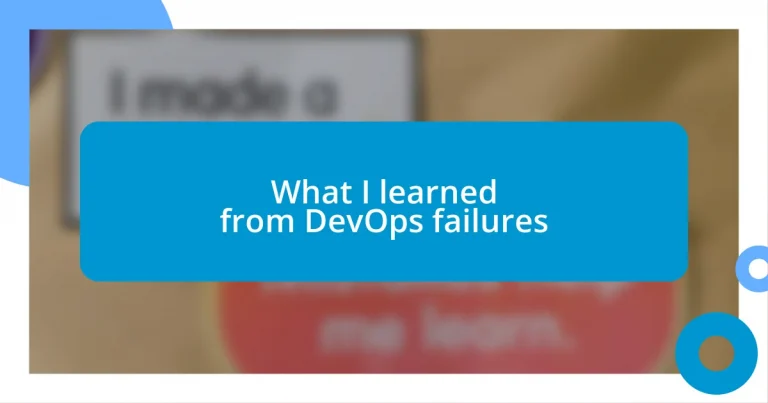Key takeaways:
- Effective DevOps implementation requires prioritizing communication and feedback loops to prevent recurring issues and foster a culture of learning.
- Avoiding pitfalls such as neglecting documentation, security, and cross-functional skills is crucial for successful project outcomes.
- Continuous improvement thrives on honest conversations, celebrating small wins, and dedicated time for reflection to drive growth and innovation.
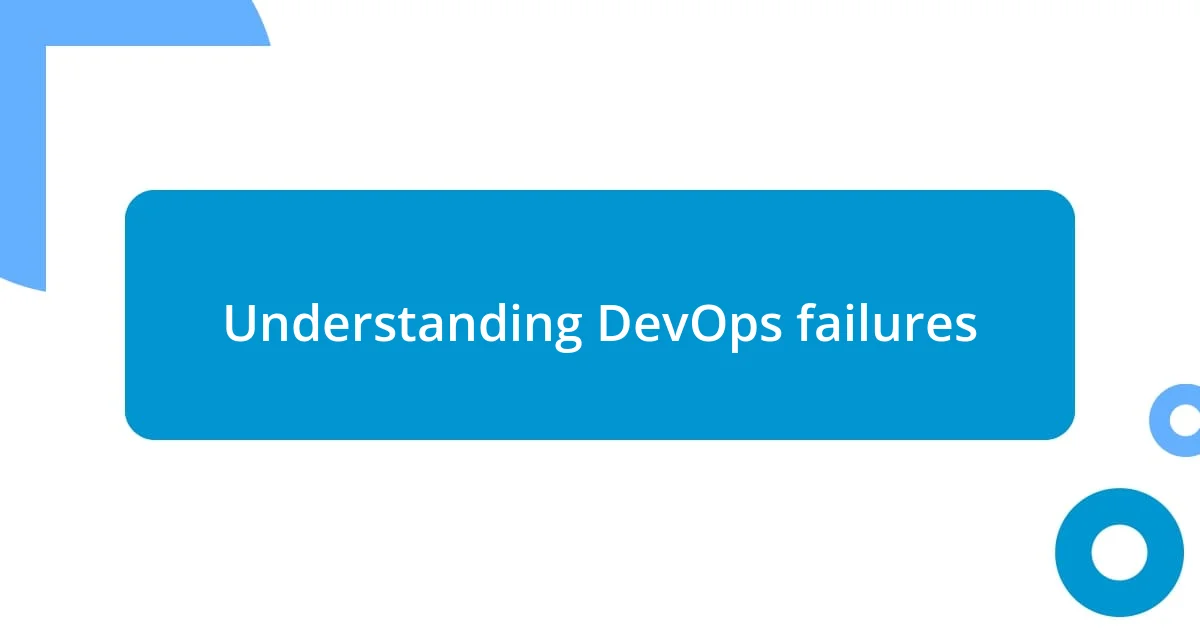
Understanding DevOps failures
DevOps failures often stem from poor communication and collaboration between development and operations teams. I remember a project where we rushed to deploy new features without aligning on shared objectives, leading to a cascade of bugs that derailed our deadlines. It makes me wonder: how often do teams skip crucial conversations in the name of speed?
Another significant factor is the lack of a proper feedback loop. I’ve observed teams that pushed changes live, only to realize too late that their monitoring systems were inadequate to catch critical issues. It’s frustrating, right? The irony is that by failing to learn from past mistakes, we create a cycle of repeated errors. I often ask myself: can we break this cycle before it’s too late?
Lastly, the cultural aspect cannot be overlooked. In my experience, teams ingrained in a blame culture are less likely to take risks or innovate, fearing repercussions for any mishaps. It’s heart-wrenching to see talent stifled by fear. Have you ever been in a situation where the pressure of avoiding blame overshadowed the opportunity for growth? When we fail to foster a supportive environment, we risk not just projects but entire careers.
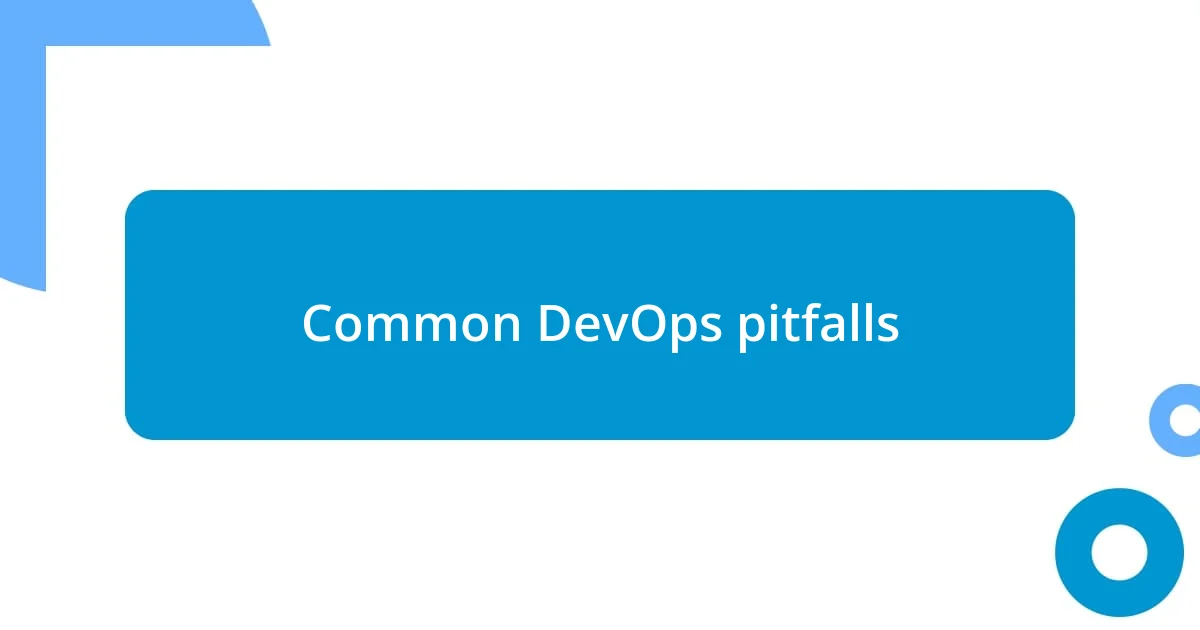
Common DevOps pitfalls
One of the most common pitfalls I’ve encountered in DevOps is the tendency to focus solely on tools instead of processes. I’ll never forget a project where we invested heavily in the latest automation software, thinking it would solve our problems overnight. But the reality hit hard when we realized our team hadn’t defined clear workflows and responsibilities. It’s a classic case of putting the cart before the horse.
Here are a few common pitfalls in DevOps:
- Ignoring Cross-Functional Skills: Teams often become siloed, neglecting to develop a hybrid skill set across development and operations.
- Overlooking Documentation: Rushing to release can lead to inadequate documentation, causing confusion down the line.
- Neglecting Security: Security often falls by the wayside in the push for speed, leaving critical vulnerabilities unaddressed.
Another pitfall that stands out for me is the fleeting nature of retrospective meetings. I’ve been part of many retros where passion ran high, but actionable insights got lost in the shuffle. Maintaining a laser focus on what needs to improve can be overshadowed by recounting war stories. It reminds me of a group therapy session where everyone felt heard, but not necessarily moved toward real change. The emotional toll of feeling unheard can lead to disengagement, which compounds the issues at hand.
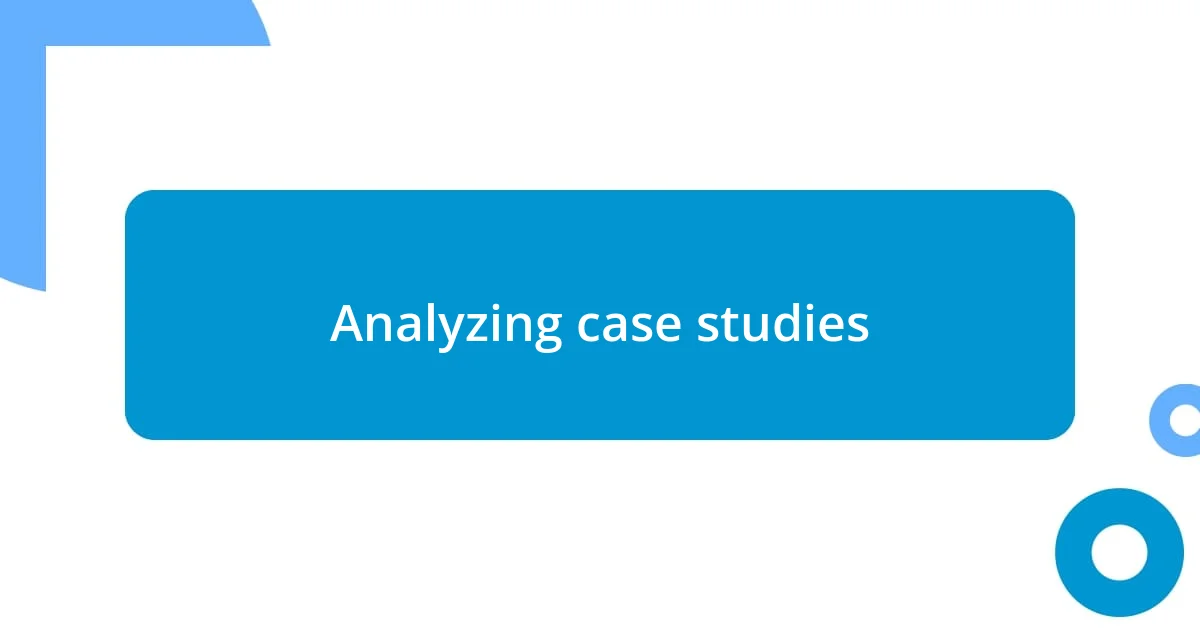
Analyzing case studies
Our journey through DevOps failures is always enhanced by analyzing case studies. I remember digging into a company’s shift to a DevOps model that resulted in a catastrophic outage. Despite their zeal for technology, the oversight of integrating systems effectively was glaring. It was a clear lesson: without a full understanding of each component, even the best tools can falter. Each failure tells us something valuable, doesn’t it?
Additionally, I once examined a case where an organization implemented cloud solutions without proper training for their staff. The blind leap led to operational chaos, with employees feeling overwhelmed and unsupported. Reflecting on that, I realize how crucial it is to invest in people alongside technology. It’s a reminder that human element is often the thread that holds successful DevOps practices together.
Finally, a notable case revealed how celebrating wins without dissecting failures can mislead teams. I witnessed one project where the team proudly presented their achievements but glossed over the issues plaguing their process. It felt like putting on a facade. The lack of accountability stunted growth and innovation. Have you ever felt the weight of unaddressed problems during a celebratory moment? Embracing transparency fosters an environment of continuous improvement.
| Case Study | Key Takeaway |
|---|---|
| Outage due to poor integration | Understanding components is vital for tech success |
| Cloud implementation without training | Invest in people, not just tools |
| Ignoring failures while celebrating wins | Transparency fuels continuous improvement |
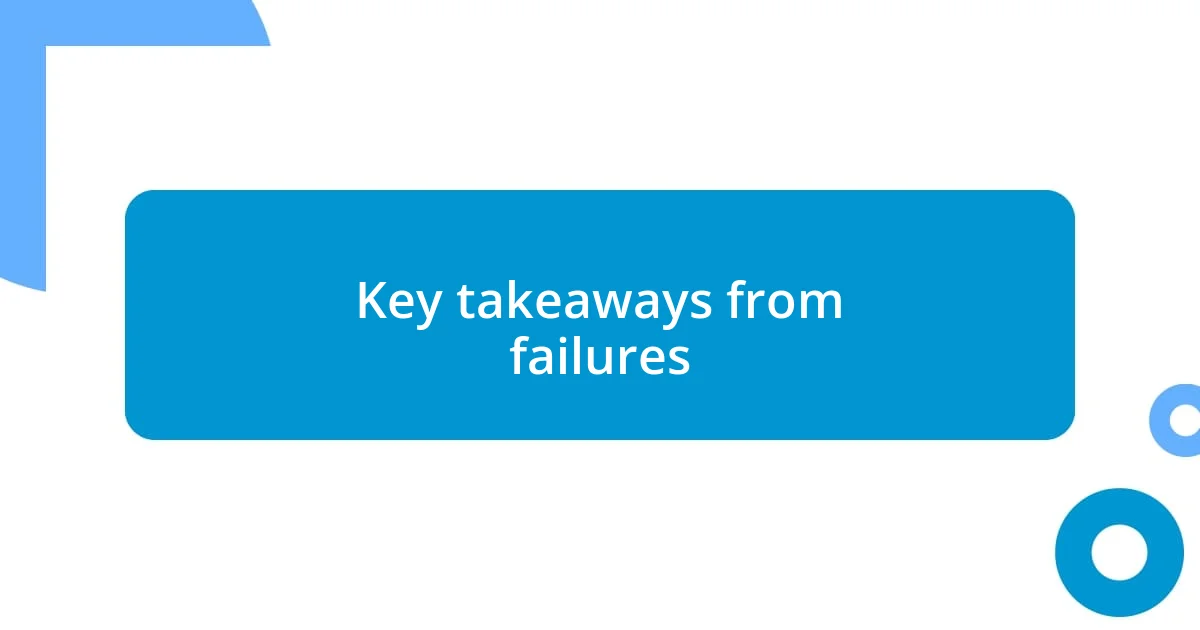
Key takeaways from failures
When I reflect on my experiences with DevOps failures, one key takeaway that resonates is the importance of continuous learning. I once worked with a team that treated our mistakes as simply obstacles to overcome, rather than as opportunities for growth. It struck me then, how our reluctance to dissect these failures led us in circles. Are we truly learning if we don’t pause to analyze what went wrong?
Another aspect to consider is the need for open communication about setbacks. I recall a project where the team was hesitant to admit mistakes during our stand-up meetings, fearing repercussions. This culture of silence created an undercurrent of stress that hindered our progress. How much more productive could we have been if we embraced vulnerability as part of our process?
Lastly, I can’t stress enough the value of establishing a feedback loop. In one project I managed, we neglected to gather input from end-users until after deployment. The detachment from the actual user experience resulted in significant rework—and disappointment. Thinking back, I wonder, how can we expect to succeed if we don’t involve those who matter most in our journey?
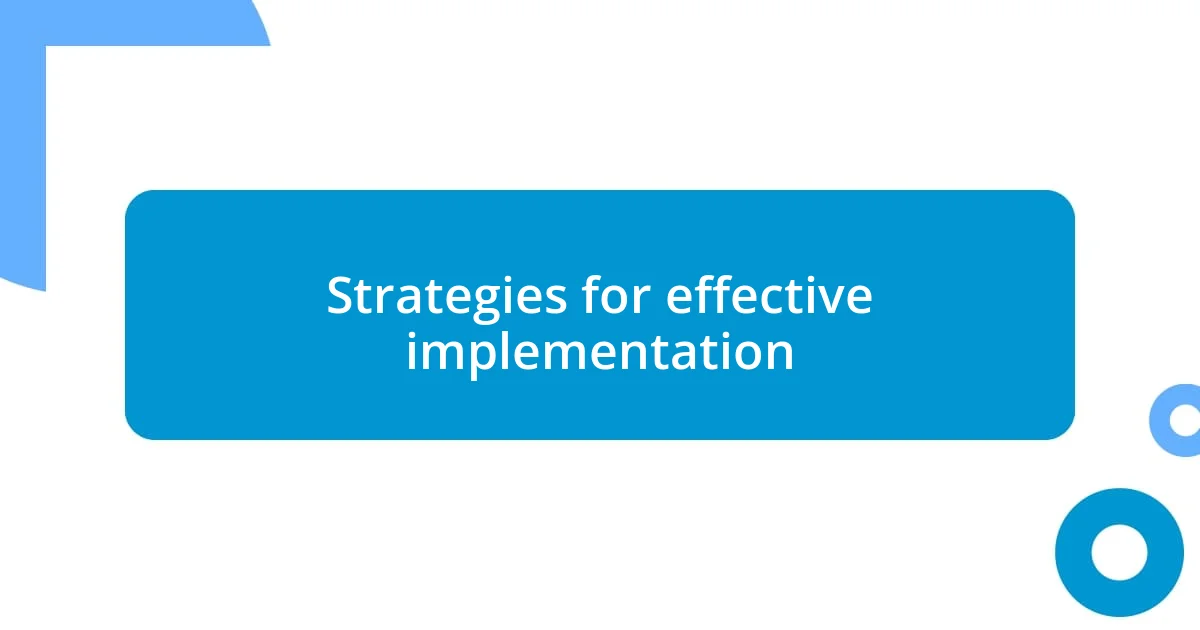
Strategies for effective implementation
Implementing DevOps effectively requires a robust strategy that prioritizes both technical and human factors. I learned this firsthand during a project where we kicked off a migration without setting clear expectations among the team. The result? Confusion reigned, and many felt left in the dark. Have you ever been part of something where you felt unsure of your role? This experience taught me the importance of alignment; everyone should be on the same page to ensure a smooth transition.
Equally critical is the focus on iterative feedback. In a past initiative, I encouraged my team to conduct regular check-ins after each sprint, but we often overlooked them in the rush to deliver on time. Looking back, I realize these moments were golden opportunities for growth that we squandered. Imagine how much stronger our outcomes could have been if we’d dedicated just a little time to reflection and adjustment. Creating time for these discussions can be a game changer.
Lastly, embracing a culture of experimentation can foster innovation. I once led a team that was hesitant to try out new tools and processes, fearing failure and judgement. This tight grip on the familiar stifled creativity and progress. Have you ever felt that tug between safety and the thrill of trying something new? I found that when we started celebrating small experiments—regardless of the results—people felt more empowered to think outside the box. It’s in this space of trial and error that real breakthroughs happen.
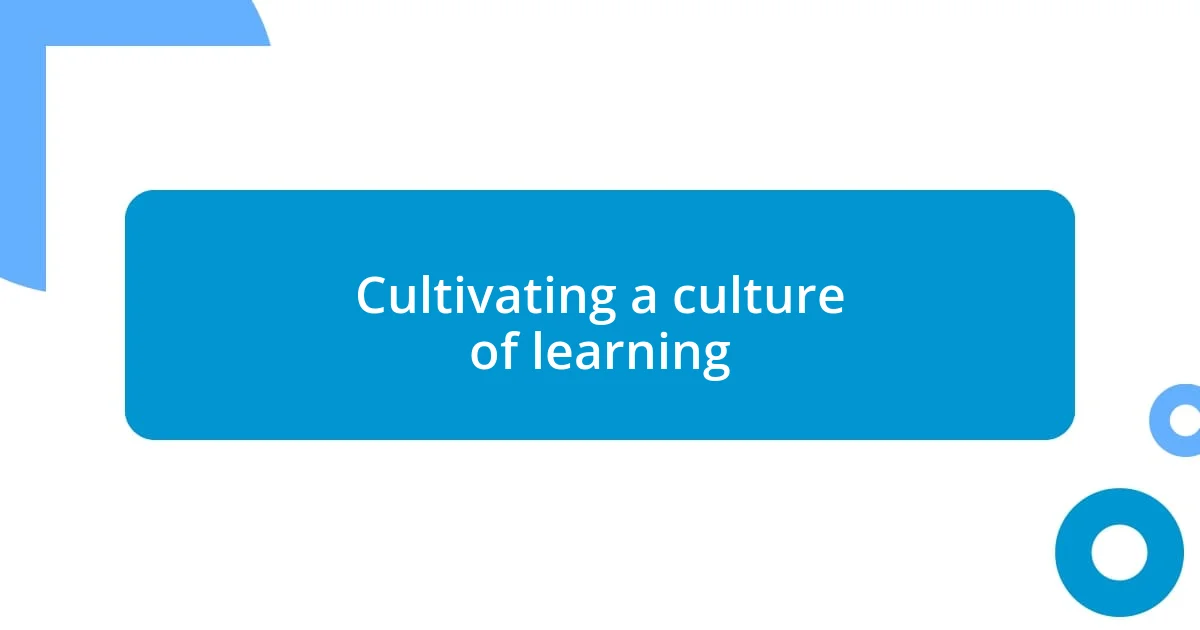
Cultivating a culture of learning
Cultivating a culture of learning begins with a shift in mindset. I remember leading a retrospective where one team member was brave enough to share their biggest mistake. The room went silent, and to my surprise, everyone leaned in, ready to absorb the lessons. It struck me then—the shared vulnerability created a powerful learning moment, making us all feel more connected. Isn’t it fascinating how one person’s experience can teach an entire team?
As I navigated through various projects, I often found that encouragement from leadership played a pivotal role in fostering this culture. In one instance, our manager publicly acknowledged failures during a team meeting, framing them as stepping stones rather than setbacks. That simple act of recognition changed the air in the room; suddenly, team members felt invited to share their missteps without fear. Have you ever witnessed how positive reinforcement can transform a workplace dynamic?
I’ve also learned the importance of dedicated time for reflection. There was a period when my team rushed straight from one project to another, skipping the crucial “lessons learned” sessions. When we finally carved out that time, I saw a shift in our approach. Discussions became richer, and the insights we uncovered were invaluable. How often do we prioritize productivity over reflection, only to lose sight of essential lessons along the way? Embracing these moments can turn our mistakes into meaningful learning experiences, and that’s where real growth happens.
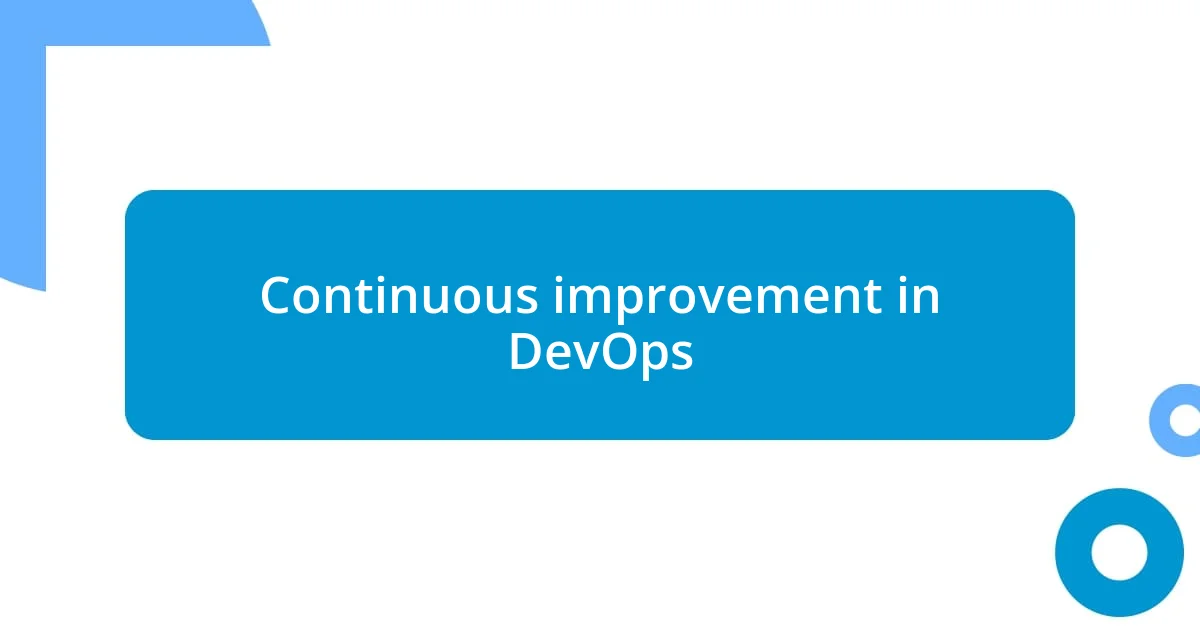
Continuous improvement in DevOps
Continuous improvement in DevOps is a journey I’ve come to appreciate deeply. In one project, we set up a feedback loop designed to capture metrics on deployment frequency and failure rates. Initially, I was skeptical; it felt like an extra task on our plate. However, once we started analyzing the data, I noticed patterns emerge that revealed underlying issues we hadn’t seen before. Isn’t it incredible how numbers can tell a story we sometimes overlook?
Another critical aspect I’ve learned is that improvement requires honest conversations about what isn’t working. I still remember a brainstorming session where I hesitated to voice my concerns about our release schedule. It wasn’t until a teammate echoed my thoughts that I saw the power of shared honesty. This moment taught me the importance of creating a safe space for team members to express their genuine feelings and thoughts. How often do we hold back, thinking our insights might not matter, only to discover that they could be the key to unlocking progress?
Most importantly, celebrating small wins plays a vital role in fostering a mindset geared toward continuous improvement. During one release, I took the time to recognize every team member’s contribution, no matter how minor they seemed. The ripple effect of that recognition was profound; it boosted morale and prompted discussions on how we could iterate further. Have you ever noticed how acknowledging progress, however small, can spark a renewed sense of purpose? It transformed our approach, pushing us to innovate and experiment with confidence.












